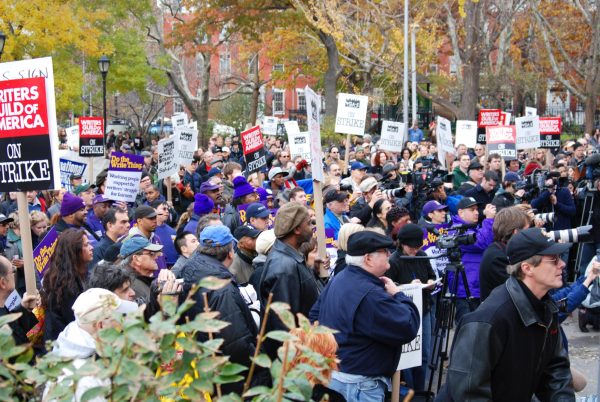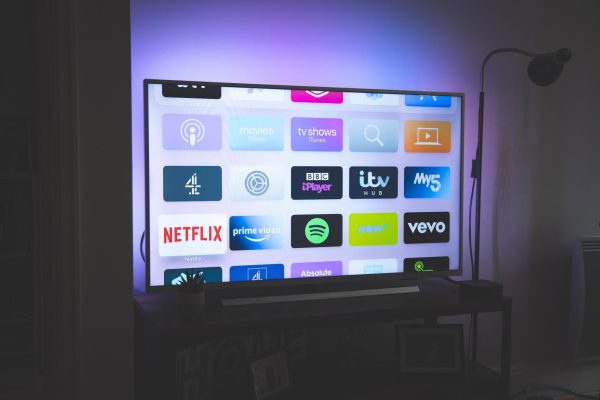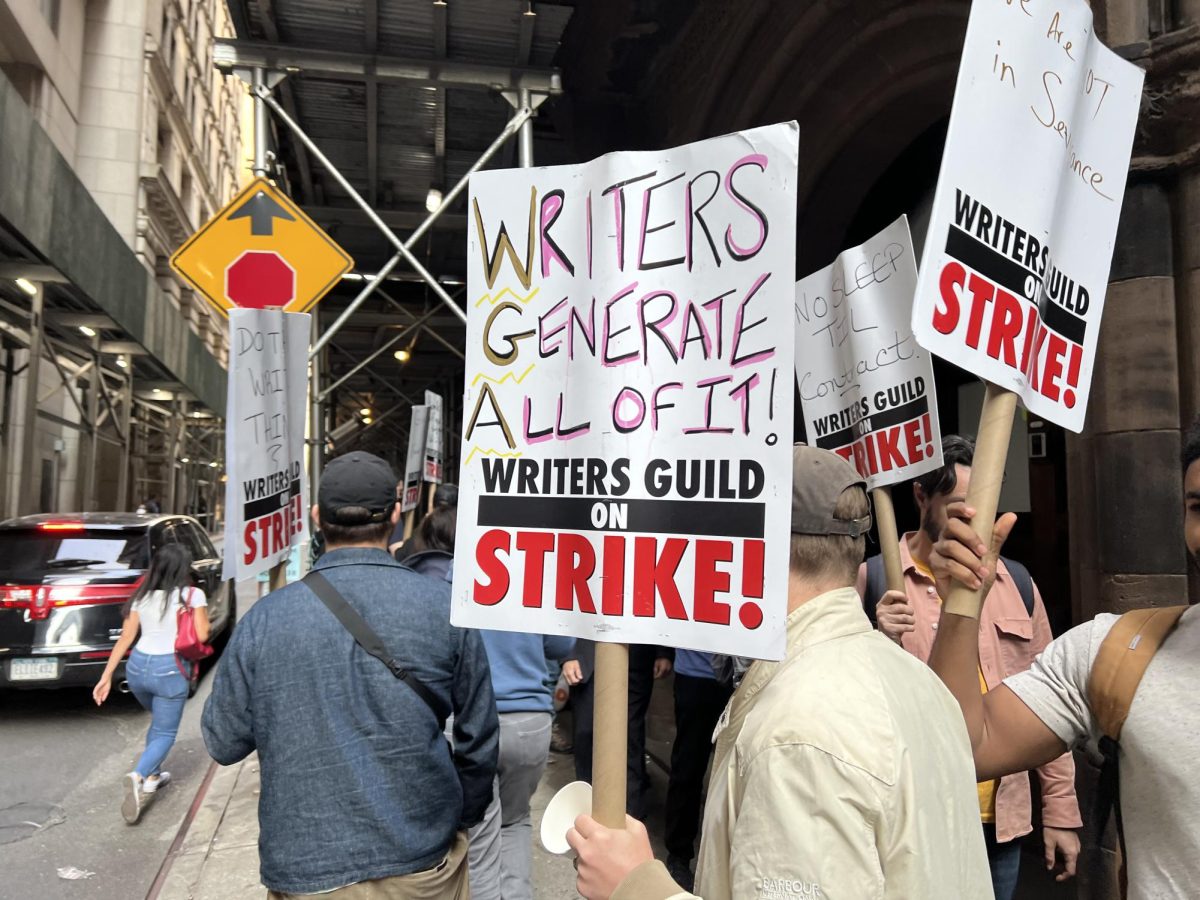The uphill battle is finally over. But it’s only one of many in a seemingly perpetual war.
The Writers’ Guild of Association (WGA), a labor union representing around 12,000 film, television and media writers, has managed to finally reach a contract deal with the Alliance of Motion Picture and Television (AMPTP), to end the second longest strike in American history. 99% of its members signed off in favor of a three-year contract deal from September 25th, 2023, to the first of May in 2026, ending the boycott and providing writers a small victory. Looking at this strike, a window is opened that sheds light on the endless struggle between corporations in Hollywood and their workers.

Actors were generally dissatisfied with working conditions well before the unions officially went on strike against their shareholders. According to the WGA contract, the entertainment industry made almost $30 billion in profits in 2021, a 25 billion dollar increase from just two decades ago. Despite these recent increases, in the past year, writer’s salaries have followed an opposite trend, as median weekly writer-producer pay has declined by 23% over the past decade. Around half of all T.V. series writers are being paid MBA minimum wage, an increase of only 20% of writers from 2013. To top it all off, writers on streaming shows are earning even less per season that they write due to shorter work periods.
These falling wages can be attributed to Hollywood’s current business model: streaming. Back in the early 2000s – the age of DVDs and VHS tapes – media companies branched out to cable television in an attempt to network their content to a bigger population, expanding their business and production. Most writers were paid a set salary per each produced episode and received additional money later through residuals.
What are Residuals?
Introduced in the WGA contract during a 1960 T.V. strike, residuals are compensation for a reuse of a writer’s work. In this case, if a screenwriter helps write a television show that gains enough popularity, they will automatically be paid a portion of the revenue accumulated from reruns in later years that will be broadcast through different channels and television stations. Otherwise known as broadcast syndication, this method provided a steady stream of income for writers and producers. Thus, screenwriting became a relatively stable and rewarding job, as writing for just one long running series could provide sufficient pay for almost a decade.

Over recent years, due to Hollywood’s shift to streaming models like Netflix, Hulu and Disney+, cable media declined rapidly, forcing writers and producers to adapt to a new meta. The move over to streaming provided a shift from a once reliable system of writers’ pay to an unstable and intangible one.
Broadcast T.V. seasons once started from late September to May, typically having a length of around 22-26 episodes per season. During the summer months — the offseason — broadcasting networks would stream reruns of their most popular programs and lower-rated first-run series. This allowed writers to receive a paycheck when they were not writing through residuals from the reruns, while also providing a window of opportunity for writers from lesser known TV shows.
The transition to streaming allowed writers to write with much more creative freedom, as regular broadcasting had a quarter of its time dedicated to advertisements, meaning that writers had to work around each ad break in order to keep the viewers interested. However, shortening the advertisements shortened the episode lengths as well, turning what was once a guaranteed, 40 week, 22-episode long T.V. season to only a 24 work week that only lasted for 8 episodes. This means only 8-10 weeks of guaranteed work, forcing writers to take up side gigs and odd jobs just to make ends meet.
Even worse, residuals, which were once used to help support writers and actors in the gap periods, have been cut down severely. As reruns and syndications became a thing of the past, factors like rating and subscriber counts introduced new variables in the formula for residual distribution, making it harder to pay the writers.
Because of this, many corporations now pay their writers a fixed salary, no matter how many times a show or movie is watched. Streaming services like Disney and Netflix only compensate their workers for the first 90 days, with virtually no other payment to their writers. The film and television industry is heading in a direction that puts immense risk and pressure on the writers themselves, while companies are reaping most of the profits that the writers helped create.

Originating from the writers themselves, grievances surrounding this change have slowly culminated with labor unions, who have raised the question of change of fairness for the writers to the corporate elites. However, due to the stubbornness and indifference of the agencies, their small voices intensified to a rallying cry. With high tensions and countless failed attempts at contract negotiations between the writers in WGA and the conglomerates in the AMPTP, the writers finally had enough.
Hundreds of screenwriters gathered on the streets of New York and Los Angeles to strike, congregating around picket lines to protest better wages. Companies were prepared to fight, however, claiming that they were prepared to endure at least a 100-day strike. Despite their claims, the strike forced studios’ work to a slow crawl, halting production and forcing them into an uncomfortable situation. For example, Netflix’s flagship show, Stranger Things halted production for several monhts and delayed its upcoming season for almost a year.
On July 14th, 2023, with an overwhelming 98% of membership vote and an unanimous board decision, SAG-AFTRA (Screen Actors Guild – American Federation of Television and Radio Artists) took arms with the writers in WGA as well, joining in Hollywood’s first double strike in 63 years. Spanning across 160,000 members, SAG-AFTRA’s support gavemuch more weight to the protesters’ concerns, providing a grave undertone of closed productions and disappearing crews.
With almost all production at a standstill, and a net loss of about 5 billion, Hollywood had no choice but to give in to the writers’ demands. On Wednesday, September 20th, 2023, the 148 days-long writers’ strike officially came to a close with a newly ratified contract between the AMPTP and the WGA, marking the end of the second longest strike in history. And on November 8th, 2023, the actors reached a deal as well, after 118 days on strike.
The writer’s contract lasts for three years from September 25, 2023 to May 1st, 2026, and it secures minimum wage increases for struggling writers. Additionally, to prevent writers from becoming unemployed for a long period of time, the contract guarantees a certain number of staff personnel in writing rooms, which provides writers a much easier time finding jobs and reduces risk of labor shortages in the writing room.
On top of that, the contract provides a guardrail for writers against the recent increase of Artificial Intelligence use, especially in writing. The contract prevents corporations from using AI as an independent entity to write and rewrite, and is only allowed to be used as a tool under the supervision of the writer. Thus, writers are able to keep AI in check and prevent the advancement of AI use, slowing the gradual replacement of AI as writers. Because of this, writers are in a relatively stable position, at least for now.
However, despite their current victory, the future still remains uncertain for most writers in the industry. This strike provided a glimpse into the unfortunate situation that writers in America face, where they are constantly manipulated by the system for which they are the backbone. Despite the contract’s nullification of AI, it is only a mere stopgap to the unfettered evolution of technology and AI. Eventually, the balance of power may tip to the corporations’ favor, and their once discreet exploitation of their writers may become even more egregious. Nevertheless, these scenarios are merely hypothetical, as only time will reveal what lies ahead. For now, writers can breathe a sigh of relief, as they have scored a victory in this war.
However, despite their current victory, the future still remains uncertain for most writers in the industry. This strike provided a glimpse into the unfortunate situation that writers in America face, where they are constantly manipulated by the system for which they are the backbone.

